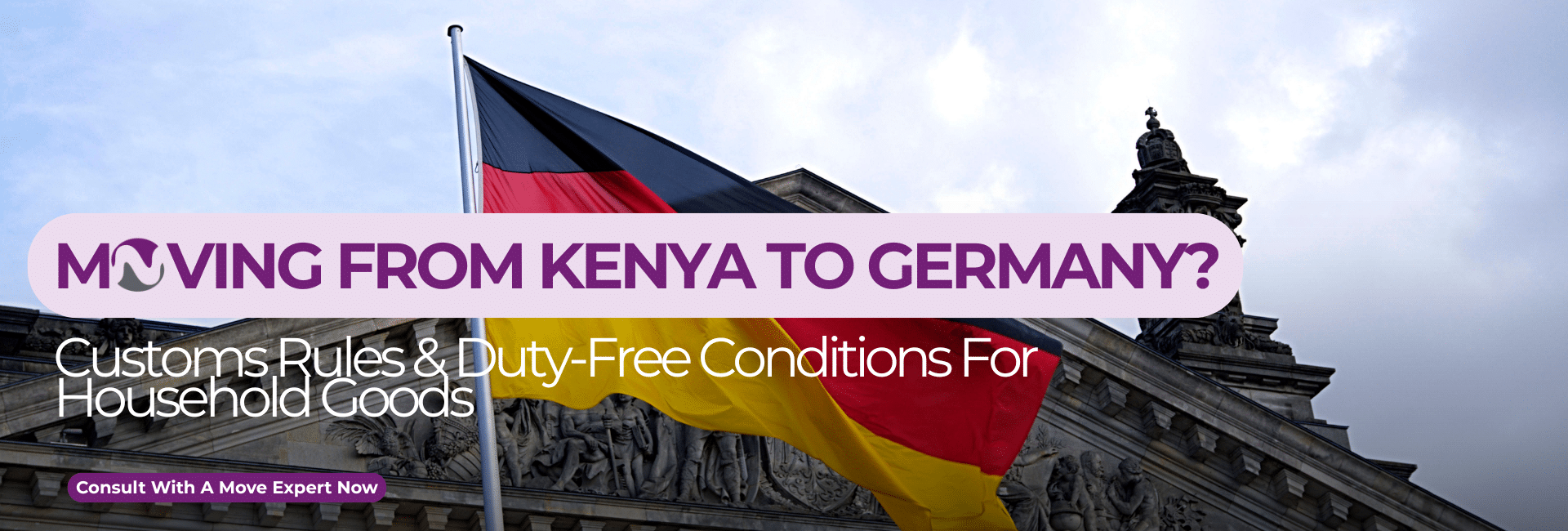That Kenya and Germany have enjoyed strong historical ties is no secret.
Germany was, in fact, the first country to recognize Kenya’s independence. Indeed, this is why German diplomatic cars in Kenya were assigned the diplomatic plate 1 CD.
Kenya assigned diplomatic plates to the countries with embassies in the country in the order that they recognized the nation’s independence. For instance, the Russian Federation was assigned the diplomatic plate 2 CD while Ethiopia was assigned 3 CD.
Located in central Europe, Germany boasts the third-largest population in Europe at 83.02 million as of 2019. It’s the 7th biggest country in Europe and the 2nd most popular destination for expatriates in the world.
For example, over 1.5 million people moved to Germany in 2019. Around 400,000 of these individuals were students. Over 13 million immigrants live in Germany, most commonly from Italy, Poland, and Turkey.
The reason Germany is quite attractive to a lot of people is that it has a robust economy and well-developed education system.
In terms of trade relations, Germany mainly imports agricultural (mainly horticultural) products from Kenya. On the other hand, Kenya imports high-value industrial and technological products that range from industrial machinery, vehicles, and electrical and telecommunications equipment.
Other interesting facts about Germany include that it’s home to Oktoberfest, which is the biggest Beer Festival in the world. The standard glass of beer in Oktoberfest, which is held in Munich, is an entire litre! Small wonder there are over 1,500 types of beer in Germany and over 5,000 brands of beer.
Here are the essential pointers to keep in mind when moving to Germany:

1. Certain Conditions Must Be Met for the Duty-Free Entry of Household Goods
Ensure the items you pack when relocating to Germany are your personal property and not of a commercial nature to avoid being charged import taxes and duties.
Household goods such as bed linen, tables, and chairs, or anything necessary for daily life may be shipped to Germany. Private cars, some domestic pets, and even portable items that are required for use in a trade or profession are also permissible.
However, commercial vehicles; items used in a trade, profession, or applied or liberal arts that are not portable; and alcohol, tobacco, cigarettes, tea, coffee, and firearms are considered taxable high-value goods.
Germany allows non-German citizens and returning Germans duty- and tax-free entry of household goods and personal effects provided they have met certain conditions. The importer:
- Must be present when his or her goods clear customs
- Must have used these goods for personal or professional purposes for at least 6 months in the country of origin
- Must not sell household goods and personal effects that have been given duty-free treatment within the year following customs clearance
- Must import and declare the household goods and personal effects within a year of registering and taking residence in Germany
- Must have resided abroad for at least 12 consecutive months (proof can include tax or rent receipts or a statement from the employer)
German citizens who have resided outside Germany for less than a year must declare their personal goods or effects and may have to pay duties and taxes on goods they bought overseas. However, the one-year requirement may be waived if the importer is returning for reasons beyond their control.
2. A Botschaftsbescheinigung – Certificate or Letter of Employment Is Necessary
Returning German citizens or European Union citizens who are seeking the duty-free entry of their household goods and personal effects must present a Botschaftsbescheinigung certificate from the German consulate in their country of origin.
The Botschaftsbescheinigung certificate serves as confirmation about the exact period a returning German citizen has lived abroad. As pointed out earlier, this period should be at least 12 consecutive months.
On the other hand, expatriates who do not fall under the EU freedom of movement regime must obtain a residence title (or permit) that authorizes them to be gainfully employed in the country. Usually, getting a residence permit to work in Germany requires that:
- You know the German language
- Your employer prove that the job position couldn’t be filled by other Germans, EU citizens, or priority workers
Getting a letter of employment or an employment contract is crucial because it determines the duration of your work/residence permit. However, this permit can be extended if you extend your job contract.
3. A Registration Certificate Called Anmeldebestätigung Must Be Obtained
An Anmeldebestätigung or Meldebestätigung is a simple A4 registration certificate that proves that you live at a certain address. It’s given to everyone who lives in Germany, whether citizen or expat.
You get this registration certificate when you register your official address (the Anmeldung) at the Bürgeramt, which is the citizens’ office.
The Anmeldebestätigung details your official address in Germany, and you’re required to show it when completing administrative tasks in the country or applying for a visa.
Processes that involve any kind of a contract will usually require an Anmeldebestätigung:
- Enrolling at a university
- Opening a bank account
- Taking out health insurance
- Applying for a residence permit
- Setting up a cell phone contract
You’re legally obliged to register your address within 14 days of moving in if you plan on staying in Germany for more than three months. You still need to register if you’ll be staying less than three months and you’d like to take out any kind of contract.
To get a registration certificate, you need to provide documents such as:
- Passport or ID card (driving licence is unacceptable)
- Proof of residence certificate (Wohnungsgeberbestätigung)
- Visa (unless your country is exempt from visa requirements)
If all your documents are in order, registration certificates are issued straight away at your local citizens’ office. However, your tax ID (more on this below) is mailed or posted to you separately.
Expert Tip: Getting your registration certificate doesn’t automatically grant expats the right to live and work in Germany. You must also apply for a residence permit to do so unless your country is exempt from this requirement.
4. You Need a Proof of Residence Certificate (Wohnungsgeberbestätigung)
Since November 1, 2015, Germany legally requires anyone renting in the country to have a Proof of Residence certificate if they wish to register their address.
The Wohnungsgeberbestätigung or Wohnungsgeberbescheinigung is a form that is filled out and signed by your landlord that confirms that you’ve moved into a new place of residence.
The need for a Wohnungsgeberbestätigung came about because of an increase in Scheinanmeldungen or sham registrations. These were instances where people registered at addresses where they did not actually live. That way, they would benefit by saving money on car insurance by registering in lower-risk areas or getting into a catchment area for good schools.
You can get a Proof of Residence certificate by downloading a template form from your local citizens’ office website, then asking your landlord or rental agency to fill it out and sign. If the landlord doesn’t own the property, you also need the owner’s signature.
A Wohnungsgeberbestätigung is provided once you’ve signed a rental contract. Make sure to take the completed form along with you to your registration appointment so that you might get your Anmeldebestätigung or registration certificate.
Expert Tip: You still need to get your landlord’s signature if you’re moving into a shared residence (Wohngemeinschaft). It’s not enough to just ask the lead tenant (Hauptmieter) to fill out the form. However, if you’ll be buying a house, you can fill out and sign the form yourself as the property’s owner.
5. Expats Living and Working in Germany Need a Tax ID
Germany issues a unique tax ID (Steuerliche Identifikationsnummer – IdNr) to everyone registered in the country for tax administration purposes.
The Federal Central Tax Office or Bundeszentralamt für Steuern (BZSt) issues both German citizens and expats with tax IDs that they’re supposed to use for their entire life. Babies, too, receive one in the mail shortly after they are born.
Your employer will require your 11-digit tax ID to pay your salary and to calculate the amount of tax you need to pay. You will be charged the maximum rate of tax if you don’t have a tax ID until you get one.
Fortunately, tax IDs are automatically issued the first time you register in Germany. But unlike the registration certificate which can be obtained immediately, your tax ID will be mailed to you in about two to three weeks.
If you’ve lost your tax ID or have never received it for any reason, you can request that it be re-sent to you on the Federal Central Tax Office’s website.
Since you can only receive your tax ID in the post for security reasons, it usually takes about four weeks to get it.
6. Expats May Need a Residence Permit, Depending on Certain Factors
Your nationality and the amount of time you plan to spend in Germany determine whether you need a German residence permit or not.
European Union (EU) and the European Economic Area (EEA) citizens, for example, can live and work freely in Germany without a visa or residence permit. They still need to register at their local citizens’ office if they are staying in Germany for more than three months.
On the other hand, non-EU/EEA citizens may need to apply for a German residence permit depending on factors such as length of stay. For example, short business and leisure stays that are less than 90 days do not usually require a residence permit.
Short stays that involve taking up employment require that one applies for a national visa and then converts it into a residence permit even if it’s for less than 90 days. Longer stays necessitate a residence permit.
There are several steps you must take before your residence permit application appointment:
- Register at your local citizens’ office (Bürgeramt) to obtain a registration certificate
- Register for and obtain German health insurance
- Open a German bank account to prove you can provide for yourself and your family
- Gather supporting documents, including:
- Valid passport
- Current biometric photo
- Certificate of registration
- Proof of health insurance
- Proof of secure livelihood (e.g., bank statements)
- Proof of purpose in Germany (e.g., employment contract)
- Completed application form for a temporary residence permit
If approved, your residence permit will be issued and you’ll be asked to collect it in person at the foreigners’ office. A PIN code may be sent to you in the post so that you might use it to collect your permit.
If your application is rejected, you’ll receive a letter outlining the reasons for the refusal. The main reason is usually failure to provide the correct corroborating documents. The rejection letter will explain the steps you should take next, and advice on how to appeal, if applicable.
With temporary residence permits typically being valid for one year, it’s important to make note of the expiry dates. That’s because the foreigners’ office doesn’t routinely notify you if your permit is due to expire. Failure to take steps to renew your permit before expiry may result in being banned from entering Germany in the future.
7. You Need to Be Prepared When House-Hunting

Housing shortages in popular German cities such as Berlin can present a problem.
While first-hand knowledge of the city or the neighbourhoods you plan to relocate to can be a big help, you can also move to Germany before you’ve found somewhere to live. This move isn’t recommended. However, you can rent a room in a hostel or on Airbnb for a couple of weeks until you find something more permanent.
Like with nearly everything else in Germany, renting a property in Germany involves filling in various forms and organizing all manner of paperwork. Your landlord will be interested in finding out if you’re a trustworthy and reliable candidate to rent their property by checking your finances and credit history.
Here are the necessary documents an expat needs for renting in Germany:
- Copy of ID or passport
- Bank statements for the last 3 months
- 3 recent payslips to prove you can foot the rent (or proof of adequate savings)
- Mieterselbstauskunft, which is an application form that gives your prospective landlord more information about you (date of birth, occupation, & number of residents on the property)
- Mietschuldenfreiheitsbescheinigung to prove that you don’t owe your previous landlords money (while your landlord might not ask for this document, it’s best to have it if possible)
- Copy of SCHUFA-Auskunft or Schufa, which is a credit report that shows your prospective landlord your credit score (since new residents don’t yet have a Schufa record, bank statements may help)
You may also need to have a letter of introduction in which you clarify what you do in Germany and why you’re looking for a new apartment. Your prospective landlord might also want to take a look at your CV.
8. You Must Meet Certain Conditions When Importing Your Car
For EU residents, it’s pretty straightforward to bring their car to Germany without restrictions.
If you plan to import your personal car from outside the EU, however, you must meet certain conditions or else pay a 10% import duty and a 19% import VAT or import turnover tax (Einfuhrumsatzsteuer).
The first thing you must do is prove you’re moving permanently to Germany:
- Have a job contract for Germany
- Have a termination letter from your former employer
- Have a letter showing the end of your property lease
- Have documents showing you’ve sold your home in your origin country
- Have proof from your employer showing you’ve been relocated to a site in Germany
You must then show that you’re establishing a new residence in Germany. A lease agreement on a property in the country, or a statement from your employer in Germany will suffice. So can proof of registration from your local residents’ registration office (Einwohnermeldeamt).
You also need to prove that you’ve been living outside Germany for a minimum of 12 consecutive months. If you’re returning to the country sooner than 12 months, then you need to indicate why your return is unavoidable.
Your vehicle must also meet certain requirements to qualify for duty-free importation:
- It must be registered in your name only
- Its owner should have a German driver’s licence
- It must have an insurance record from the country of origin
- Its owner must arrive in Germany at around the same time as it does
- It must be kept for personal use during the first year you have it in Germany
- It should have third-party liability insurance that begins with customs clearance
- Its owner must have German police registration (Polizieliche Anmeldebestatigung)
- It must have been used by only you in your previous country for at least 6 months (the vehicle’s registration certificate may be used as proof)
- It must pass an inspection for emissions control, roadworthiness, and safety (it may also require certain modifications to meet German standards)
Moving from Kenya to Germany?

Goods can be shipped from Kenya to Germany by either air or sea with reasonable ease.
In fact, it usually takes about 60 days to complete a door-to-door move from Nairobi to most German cities including Berlin, Bremen, Bonn, Cologne, Munich, Hamburg, and Frankfurt by sea.
Remember, you need to have these documents at the ready when importing used household goods and personal effects into Germany:
- Copy of your visa
- Copy of your passport
- Bill of lading/air waybill
- Signed customs declaration
- Packing list (in English or German)
- Letter of employment/botschaftsbescheinigung
- Anmeldebestaetigung (certificate of registration)
- Customs registration form 0350 (stating goods won’t be sold for 12 months)
Diplomats also need to have the diplomatic entry form 0349 as well as a certificate from the diplomatic organization in Germany.
Don’t fall victim to Germany’s legendary bureaucracy and suffer adverse consequences such as a permanent ban from returning to the country for missing a step.
Therefore, it’s best to involve trusted international movers to help you navigate the intricate process of moving to Germany. In the meantime, consider sharpening up your German language skills because you’ll be needing them!













